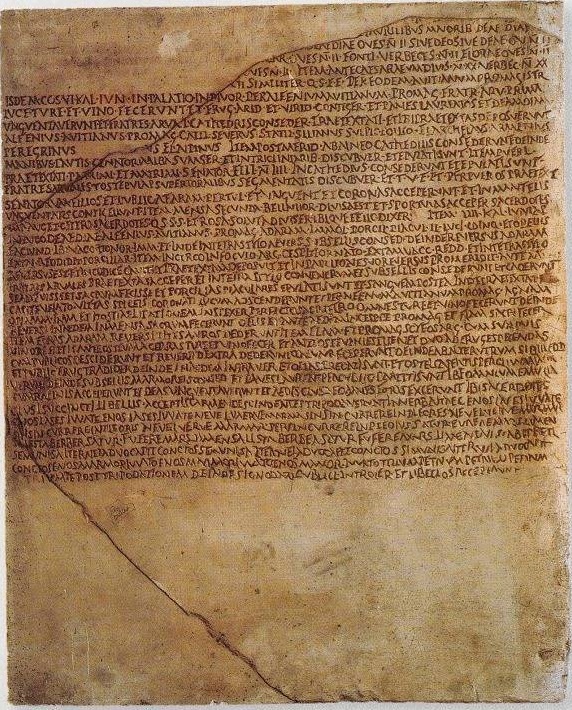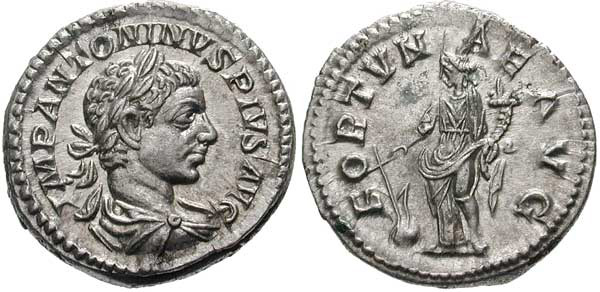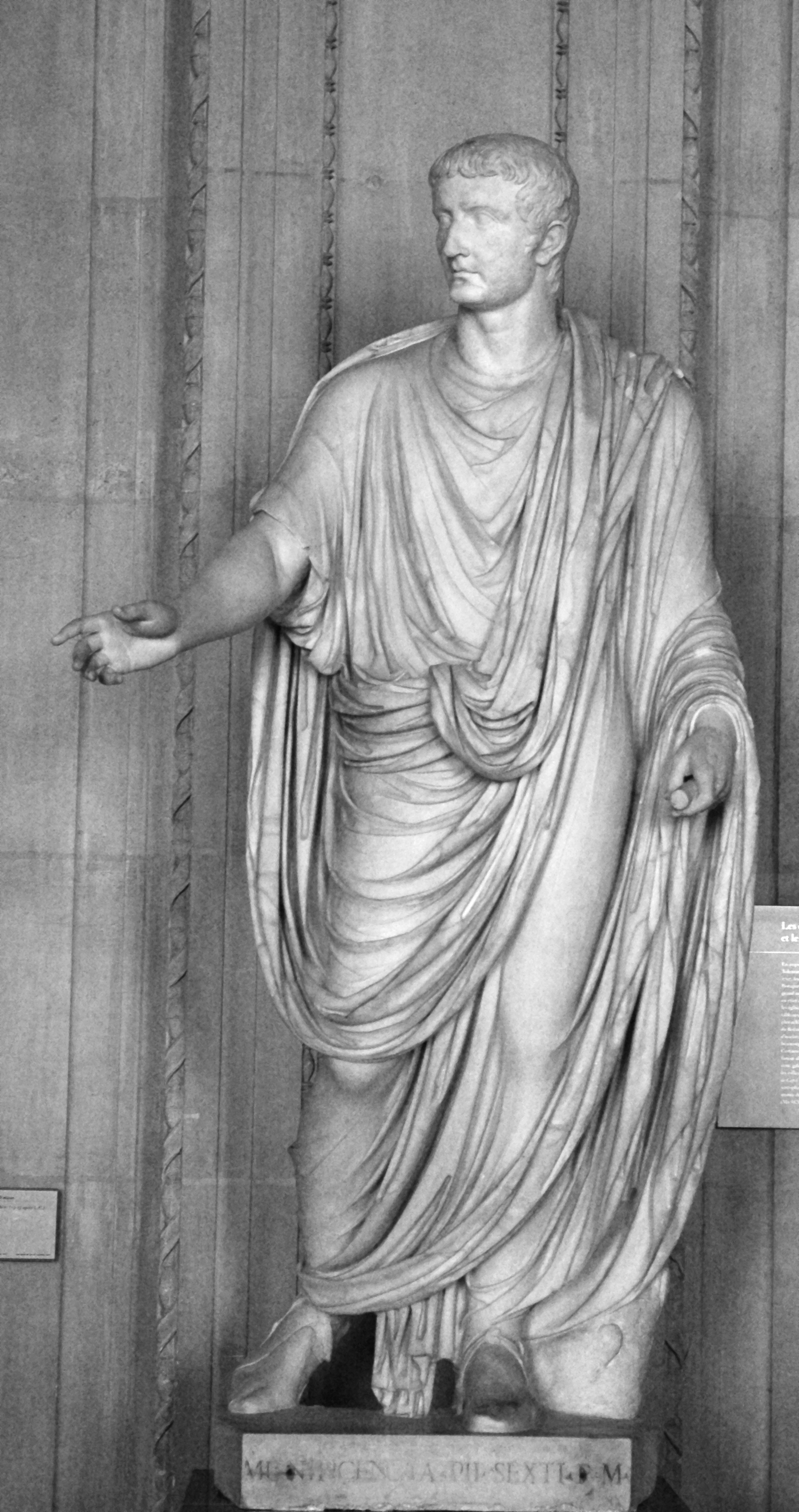|
Fratres Arvales
In ancient Roman religion, the Arval Brethren ( la, Fratres Arvales, "Brothers of the Fields") or Arval Brothers were a body of priests who offered annual sacrifices to the Lares and gods to guarantee good harvests. Inscriptions provide evidence of their oaths, rituals and sacrifices. Origin Roman legend held that the priestly college was originated by Romulus, first king of Rome, who took the place of a dead son of his nurse Acca Laurentia, and formed the priesthood with the remaining eleven sons. They were also connected originally with the Sabine priesthood of ''Sodales Titii'' who were probably originally their counterpart among the Sabines. Thus, it can be inferred that they existed before the founding of the city.Aulus Gellius VII 7, 7; Pliny XVII 2, 6. There is further proof of the high antiquity of the college in the verbal forms of the song with which, down to late times, a part of the ceremonies was accompanied, and which is still preserved. They persisted to the impe ... [...More Info...] [...Related Items...] OR: [Wikipedia] [Google] [Baidu] |
Lucius Verus Frater Arvalis Louvre Ma1169
Lucius ( el, Λούκιος ''Loukios''; ett, Luvcie) is a male given name derived from ''Lucius'' (abbreviated ''L.''), one of the small group of common Latin forenames (''praenomina'') found in the culture of ancient Rome. Lucius derives from Latin word ''Lux'' (gen. ''lucis''), meaning "light" (< ''*leuk-'' "brightness", Latin verb ''lucere'' "to shine"), and is a of the name . Another etymology proposed is a derivation from ''Lauchum'' (or ''Lauchme'') meaning " |
Carmen Arvale
The ''Carmen Arvale'' is the preserved chant of the Arval priests or ''Fratres Arvales'' of ancient Rome. The Arval priests were devoted to the goddess Dia, and offered sacrifices to her to ensure the fertility of ploughed fields (Latin ''arvum''). There were twelve Arval priests, chosen from patrician families. During the Roman Empire the Emperor was always an Arval priest. They retained the office for life, even if disgraced or exiled. Their most important festival, the Ambarvalia, occurred during the month of May, in a grove dedicated to Dia. The ''Carmen Arvale'' is preserved in an inscription dating from 218 AD, which contains records of the meetings of the Arval Brethren. It is written in an archaic form of Old Latin, likely not fully understood any more at the time the inscription was made. One of its interpretations goes as follows: :''enos Lases iuuate'' :''enos Lases iuuate'' :''enos Lases iuuate'' :''neue lue rue Marmar sins incurrere in pleores'' :''neue l ... [...More Info...] [...Related Items...] OR: [Wikipedia] [Google] [Baidu] |
Livy
Titus Livius (; 59 BC – AD 17), known in English as Livy ( ), was a Ancient Rome, Roman historian. He wrote a monumental history of Rome and the Roman people, titled , covering the period from the earliest legends of Rome before the traditional founding in 753 BC through the reign of Augustus in Livy's own lifetime. He was on familiar terms with members of the Julio-Claudian dynasty and a friend of Augustus, whose young grandnephew, the future emperor Claudius, he exhorted to take up the writing of history. Life Livy was born in Patavium in northern Italy (Roman Empire), Italy, now modern Padua, probably in 59 BC. At the time of his birth, his home city of Patavium was the second wealthiest on the Italian peninsula, and the largest in the province of Cisalpine Gaul (northern Italy). Cisalpine Gaul was merged in Roman Italy, Italy proper during his lifetime and its inhabitants were given Roman citizenship by Julius Caesar. In his works, Livy often expressed his deep affection an ... [...More Info...] [...Related Items...] OR: [Wikipedia] [Google] [Baidu] |
Cicero
Marcus Tullius Cicero ( ; ; 3 January 106 BC – 7 December 43 BC) was a Roman statesman, lawyer, scholar, philosopher, and academic skeptic, who tried to uphold optimate principles during the political crises that led to the establishment of the Roman Empire. His extensive writings include treatises on rhetoric, philosophy and politics, and he is considered one of Rome's greatest orators and prose stylists. He came from a wealthy municipal family of the Roman equestrian order, and served as consul in 63 BC. His influence on the Latin language was immense. He wrote more than three-quarters of extant Latin literature that is known to have existed in his lifetime, and it has been said that subsequent prose was either a reaction against or a return to his style, not only in Latin but in European languages up to the 19th century. Cicero introduced into Latin the arguments of the chief schools of Hellenistic philosophy and created a Latin philosophical vocabulary ... [...More Info...] [...Related Items...] OR: [Wikipedia] [Google] [Baidu] |
Elagabalus
Marcus Aurelius Antoninus (born Sextus Varius Avitus Bassianus, 204 – 11/12 March 222), better known by his nickname "Elagabalus" (, ), was Roman emperor from 218 to 222, while he was still a teenager. His short reign was conspicuous for sex scandals and religious controversy. A close relative to the Severan dynasty, he came from a prominent Arab family in Emesa ( Homs), Syria, where since his early youth he served as head priest of the sun god Elagabal. After the death of his cousin, the emperor Caracalla, Elagabalus was raised to the principate at 14 years of age in an army revolt instigated by his grandmother Julia Maesa against Caracalla's short-lived successor, Macrinus. He only posthumously became known by the Latinised name of his god. Later historians suggest Elagabalus showed a disregard for Roman religious traditions and sexual taboos. He replaced the traditional head of the Roman pantheon, Jupiter, with the deity Elagabal, of whom he had been high priest. He ... [...More Info...] [...Related Items...] OR: [Wikipedia] [Google] [Baidu] |
Marcus Aurelius
Marcus Aurelius Antoninus (Latin: áːɾkus̠ auɾέːli.us̠ antɔ́ːni.us̠ English: ; 26 April 121 – 17 March 180) was Roman emperor from 161 to 180 AD and a Stoic philosopher. He was the last of the rulers known as the Five Good Emperors (a term coined some 13 centuries later by Niccolò Machiavelli), and the last emperor of the Pax Romana, an age of relative peace and stability for the Roman Empire lasting from 27 BC to 180 AD. He served as Roman consul in 140, 145, and 161. Marcus Aurelius was born during the reign of Hadrian to the emperor's nephew, the praetor Marcus Annius Verus, and the heiress Domitia Calvilla. His father died when he was three, and his mother and grandfather raised him. After Hadrian's adoptive son, Aelius Caesar, died in 138, the emperor adopted Marcus's uncle Antoninus Pius as his new heir. In turn, Antoninus adopted Marcus and Lucius, the son of Aelius. Hadrian died that year, and Antoninus became emperor. Now heir to the throne, ... [...More Info...] [...Related Items...] OR: [Wikipedia] [Google] [Baidu] |
Toga Praetexta
The toga (, ), a distinctive garment of ancient Rome, was a roughly semicircular cloth, between in length, draped over the shoulders and around the body. It was usually woven from white wool, and was worn over a tunic. In Roman historical tradition, it is said to have been the favored dress of Romulus, Rome's founder; it was also thought to have originally been worn by both sexes, and by the citizen-military. As Roman women gradually adopted the stola, the toga was recognized as formal wear for male Roman citizens. Women engaged in prostitution might have provided the main exception to this rule.. The type of toga worn reflected a citizen's rank in the civil hierarchy. Various laws and customs restricted its use to citizens, who were required to wear it for public festivals and civic duties. From its probable beginnings as a simple, practical work-garment, the toga became more voluminous, complex, and costly, increasingly unsuited to anything but formal and ceremonial use. ... [...More Info...] [...Related Items...] OR: [Wikipedia] [Google] [Baidu] |
Roman Senate
The Roman Senate ( la, Senātus Rōmānus) was a governing and advisory assembly in ancient Rome. It was one of the most enduring institutions in Roman history, being established in the first days of the city of Rome (traditionally founded in 753 BC). It survived the overthrow of the Roman monarchy in 509 BC; the fall of the Roman Republic in the 1st century BC; the division of the Roman Empire in AD 395; and the fall of the Western Roman Empire in 476; Justinian's attempted reconquest of the west in the 6th century, and lasted well into the Eastern Roman Empire's history. During the days of the Roman Kingdom, most of the time the Senate was little more than an advisory council to the king, but it also elected new Roman kings. The last king of Rome, Lucius Tarquinius Superbus, was overthrown following a coup d'état led by Lucius Junius Brutus, who founded the Roman Republic. During the early Republic, the Senate was politically weak, while the various executive magistr ... [...More Info...] [...Related Items...] OR: [Wikipedia] [Google] [Baidu] |
Praetor
Praetor ( , ), also pretor, was the title granted by the government of Ancient Rome to a man acting in one of two official capacities: (i) the commander of an army, and (ii) as an elected '' magistratus'' (magistrate), assigned to discharge various duties. The functions of the magistracy, the ''praetura'' (praetorship), are described by the adjective: the ''praetoria potestas'' (praetorian power), the ''praetorium imperium'' (praetorian authority), and the ''praetorium ius'' (praetorian law), the legal precedents established by the ''praetores'' (praetors). ''Praetorium'', as a substantive, denoted the location from which the praetor exercised his authority, either the headquarters of his '' castra'', the courthouse (tribunal) of his judiciary, or the city hall of his provincial governorship. History of the title The status of the ''praetor'' in the early republic is unclear. The traditional account from Livy claims that the praetorship was created by the Sextian-Licinian Rogatio ... [...More Info...] [...Related Items...] OR: [Wikipedia] [Google] [Baidu] |
Flamen
A (plural ''flamens'' or ''flamines'') was a priest of the ancient Roman religion who was assigned to one of eighteen deities with official cults during the Roman Republic. The most important of these were the three (or "major priests"), who served the important Roman gods Jupiter, Mars, and Quirinus. The remaining twelve were the ("lesser priests"). Two of the served deities whose names are now unknown; among the others are deities about whom little is known other than the name. During the Imperial era, the cult of a deified emperor () also had a flamen. The fifteen Republican flamens were members of the Pontifical College, who administered state-sponsored religion. When the office of flamen was vacant, a could serve as a temporary replacement, although only the is known to have substituted for the , one of the . Etymology The etymology of remains obscure, and perhaps undecidable.Andrew Sihler ''New Comparative Grammar of Greek and Latin,'' Oxford University Press 1995 ... [...More Info...] [...Related Items...] OR: [Wikipedia] [Google] [Baidu] |
Augustus
Caesar Augustus (born Gaius Octavius; 23 September 63 BC – 19 August AD 14), also known as Octavian, was the first Roman emperor; he reigned from 27 BC until his death in AD 14. He is known for being the founder of the Roman Principate, which is the first phase of the Roman Empire, and Augustus is considered one of the greatest leaders in human history. The reign of Augustus initiated an imperial cult as well as an era associated with imperial peace, the ''Pax Romana'' or ''Pax Augusta''. The Roman world was largely free from large-scale conflict for more than two centuries despite continuous wars of imperial expansion on the empire's frontiers and the year-long civil war known as the "Year of the Four Emperors" over the imperial succession. Originally named Gaius Octavius, he was born into an old and wealthy equestrian branch of the plebeian ''gens'' Octavia. His maternal great-uncle Julius Caesar was assassinated in 44 BC, and Octavius was named in Caesar' ... [...More Info...] [...Related Items...] OR: [Wikipedia] [Google] [Baidu] |
Roman Republic
The Roman Republic ( la, Res publica Romana ) was a form of government of Rome and the era of the classical Roman civilization when it was run through public representation of the Roman people. Beginning with the overthrow of the Roman Kingdom (traditionally dated to 509 BC) and ending in 27 BC with the establishment of the Roman Empire, Rome's control rapidly expanded during this period—from the city's immediate surroundings to hegemony over the entire Mediterranean world. Roman society under the Republic was primarily a cultural mix of Latin and Etruscan societies, as well as of Sabine, Oscan, and Greek cultural elements, which is especially visible in the Roman Pantheon. Its political organization developed, at around the same time as direct democracy in Ancient Greece, with collective and annual magistracies, overseen by a senate. The top magistrates were the two consuls, who had an extensive range of executive, legislative, judicial, military, and religious powers ... [...More Info...] [...Related Items...] OR: [Wikipedia] [Google] [Baidu] |









